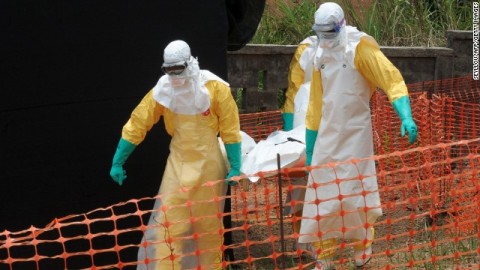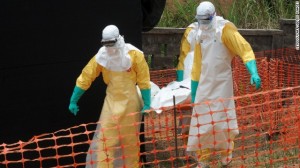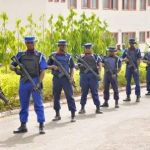What to Know Beyond the Fear of Ebola that Travels Faster Than the Virus
Articles/Opinion, Latest Headlines, Prof.R.A Ipinyomi Wednesday, October 15th, 2014
By Prof. R. A. Ipinyomi, University of Ilorin, Nigeria
The world is now august with the presence of the Ebola Virus. The virus was discovered sometime in 1977 along a Congo River which also gave the deadly virus its name. It is no longer a great piece of news that Ebola is in West Africa and even that its effects came to Nigeria shores. Thanks to the quick intervention to contain and destroy the spread of the virus in Lagos and in the Eastern parts of Nigeria. The fight against Ebola in Nigeria was spearheaded by the Federal Minister of Health and the Lagos State Governor and supported by the Federal Government of Nigeria. A timely and appropriate intervention could make a difference and safe many lives even when we have no cure.
 We will like our readers to be further educated on this deadly virus and know how to continually contain and eradicate the virus. There must be a complete tenacious response from all stakeholders in the community to fight this virus. At present quarantine an infected individual is the only safe way known so far. Quarantine is not a sentence to death but a method to stop further circulation that may affect more members of the population. For example if you do not have Ebola virus in your system right now and you can avoid contact with a known source then you should never have it. The medical people will continually educate the public; unfortunately these medical workers are the first on the risk line. As they attempt to assist the Ebola patients they put themselves at great risks. Family members must decide on losing just a member or be emotional or dishonest about it and lose most members in the family by refusing to report an incident. Openness and complete honesty is needed to confront this deadly disease collectively. Nigeria must come forward with methods of reporting and handling hypothetical cases carrying the public along.
We will like our readers to be further educated on this deadly virus and know how to continually contain and eradicate the virus. There must be a complete tenacious response from all stakeholders in the community to fight this virus. At present quarantine an infected individual is the only safe way known so far. Quarantine is not a sentence to death but a method to stop further circulation that may affect more members of the population. For example if you do not have Ebola virus in your system right now and you can avoid contact with a known source then you should never have it. The medical people will continually educate the public; unfortunately these medical workers are the first on the risk line. As they attempt to assist the Ebola patients they put themselves at great risks. Family members must decide on losing just a member or be emotional or dishonest about it and lose most members in the family by refusing to report an incident. Openness and complete honesty is needed to confront this deadly disease collectively. Nigeria must come forward with methods of reporting and handling hypothetical cases carrying the public along.
The fear of Ebola has gripped them in far away Dallas in the United States of America since the arrival of one Mr. Thomas Duncan from Liberia. He arrived into America with Ebola virus in his system unknowingly, undetected at the airport on arrival and he later died after a brief hospitalization. The deed had been done and two of the medical workers that treated Mr. Duncan are now themselves patients of same Ebola. This is very disturbing breaking news on the Ebola front coming from the United State because we had thought that health workers would have enjoyed proper protection in the USA. The second disturbing news is that a report from World Health Organization WHO now says that Ebola incubation period can last six weeks instead of the three weeks we have been working with. Now 42 days is twice the 21 days duration we had been told all along and which would now require twice the length of quarantine time for people who may have had a contact with an incident. It is often very difficult to trace who and who may have had contact with an Ebola patient before quarantine and to extend the period of search backward is addition complication and costs. Yet in our attempt to eradicate the pandemic all its parameters must be known and used for both analysis and the cure.
Before now the USA have been showing video clips on how to get their health workers ready and they do it in the usual combative ways. However when the chips are down from only one Mr. Duncan two nurses are already caught in Ebola webs. It would appear that Ebola training for medical staff in USA was nothing more than an ordinary optional seminar at the hospital and different from reality seminar. There seems to be some failures by the medical system to contain Ebola for now in Dallas or a major disconnection between theory and reality.
Of course we all need to always get prepared to confront this deadly virus at work, at home, during travel, in public places and especially when we meet strangers whose Ebola status are unknown. One preparation is to travel less frequently and isolate more often. Those who frequent hotels, picking less known persons by the road side and public places must do so henceforth with extra caution and having the protection of members of their family members mind. We must live in such a way to protect both ourselves and our primary community members. Helping patients should be by reporting and isolation of the individuals before calling for help. Generally we would encourage more frequent showers and baths daily after every outing. As we treated the cases of HIV/AIDS sex workers may have to be stopped until Ebola torrential currents are over.
While Ebola is not a death sentence it may teach each family to learn how to build a family emergency isolation room. It is becoming very necessary to learning how to construct and operate an emergency isolation room in your own home. The hospitals may not be available for every patient as we currently have in Sierra Leone and in Liberia or that the hospitals could be overrun and unavailable. We are not encouraging hiding Ebola patients in homes, far from it, but we are sensitizing that government provisions and resources may not be enough in poor and rural Africa. I was deeply encouraged by the recent efforts of both the Lagos State and Federal Minister of Health but we must not think that Ebola scare is over. That case was just an incidence and treated successfully. The mistake of overconfidence in the arena of Ebola could be more catastrophic than been complacent and uninformed. Ebola is real and it is spreading not only in West Africa but also in Europe and USA. Its fears grip the blacks and the whites, the old and the young. However if your present Ebola status is “Ebola Free” you can maintain that status by being extra careful. The fear of Ebola can be more deadly than the virus and may ruin our relationships. We are born to bear each others burden even when Ebola breaks our in Monrovia, Freetown, Lagos, Dallas or anywhere in Europe. We are still our brothers’ keepers. Only be sure to take every precaution.
Prof. R. A. Ipinyomi
ipinyomira@yahoo.co.uk or/and raipinyomi@unilorin.edu.ng
Related Posts
Short URL: https://www.africanexaminer.com/?p=18736






















